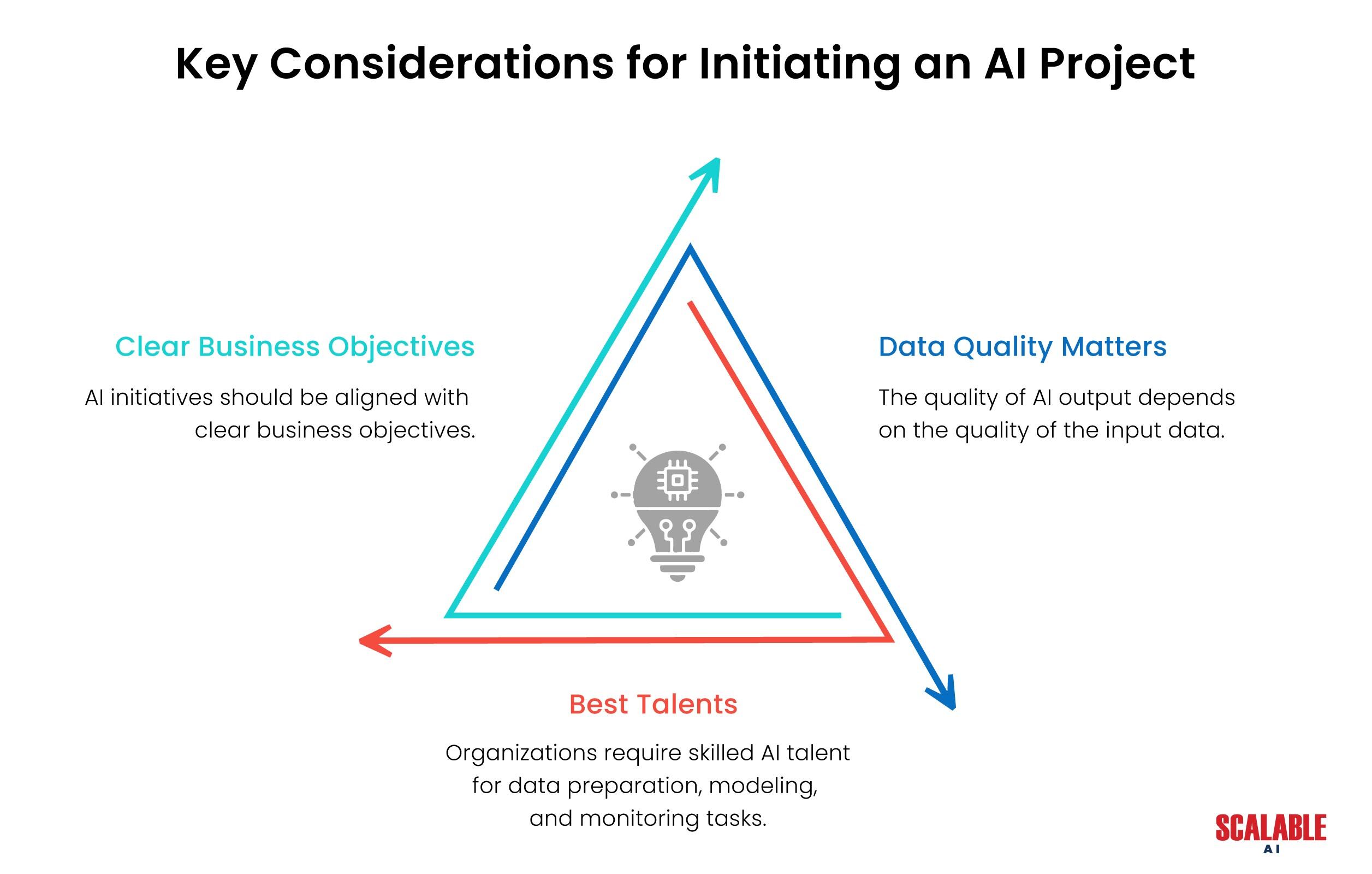Executive Summary :
It’s 2024, and Artificial Intelligence projects are helping organizations create value for businesses and consumers. Certainly, Artificial intelligence (AI) is driving today’s business landscape. Unsurprisingly, many companies have put AI at the core of their business and technology initiatives. However, there’s a gap between planning and outcomes when implementing AI projects. What’s known is that several AI-based projects don’t achieve their desired goals. The real question is, how do you increase the chances of the AI project succeeding? There is no single answer to it. However, a clear purpose or objective goes a long way in delivering the AI project successfully. Take a deep dive into the article, which analyzes the reasons that make the difference between failure and success for AI Projects.
Key considerations before initiating the AI Project
AI models that have reached the production stage and integrated with the business functions could be termed successful AI projects. Read along to learn the key considerations to be analyzed before moving ahead with an AI project.
Clear Business Objectives
Numerous AI projects fall short due to overly unrealistic expectations about desired capabilities. When starting an AI initiative, it’s incumbent on the stakeholders to outline clear project goals. It’s critical to align your AI strategies with the business goals. Enterprises must outline their responses to questions like Are you planning to reduce customer churn, detect fraud, or faster loan processing? From the start, be clear on the use cases, deliverables deadline, performance assessment, and define the metrics. With a data-driven approach, enterprises will have a better chance of succeeding.
Best Talent
Achieving success with AI projects goes beyond implementing the right processes. Organizations need a pool of specialized talent that can deliver the right expertise in work like data preparation, data transformation, model training, and monitoring. This strenuous work requires collaboration between different resources, such as data engineers, architects, engineers, and domain experts. Organizations should spend time and resources building the right team to deliver a successful AI project within time and budget.

Good Data Quality
Garbage in, garbage out (GIGO) is an important concept and idea in artificial intelligence (AI). The term highlights the importance of quality data for successful AI project execution. We can expect setbacks if the input data to the AI model or algorithm is of sub-standard quality. AI models, whether machine learning or deep learning models, heavily depend on the data used for training and validation. The resulting AI model will likely produce unreliable or biased results if the training data is biased, incomplete, or contains errors. Stakeholders must ensure the correct input data is available for the right results. Best practices for a successful AI Project Outline Clear Goals: Don’t jump into AI for the sake of it. Identify your company’s specific needs and how AI can address them. AI is powerful, but it needs a target to hit. High-Quality Data: AI needs a strong foundation of quality data for achieving desired results. Successful companies invest in clean, accurate data to ensure the reliability of their AI models. Embrace Innovation: Encourage your team to think creatively and experiment with AI. A culture that welcomes new ideas is essential for getting the most out of this technology. Continuous learning: The world of AI is constantly evolving. Successful businesses train their resources to stay current with the latest advancements.
Conclusion
Artificial Intelligence (AI) presents significant opportunities and benefits for enterprises. Advanced AI projects manage complex tasks involving large data volumes and intricate variables, all with remarkable speed and precision. Cutting-edge algorithms empower organizations to discover patterns, make predictions, identify anomalies, and generate insights. The capabilities contribute to enhanced business decision-making processes, but it’s crucial to anticipate challenges during AI projects to ensure a smooth development experience and avoid potential disruptions. A successful AI project needs a cohesive strategy, specialized resources, and constant monitoring.
Read Whitepaper AI Project Success: Demystifying the Path to Breakthroughs
